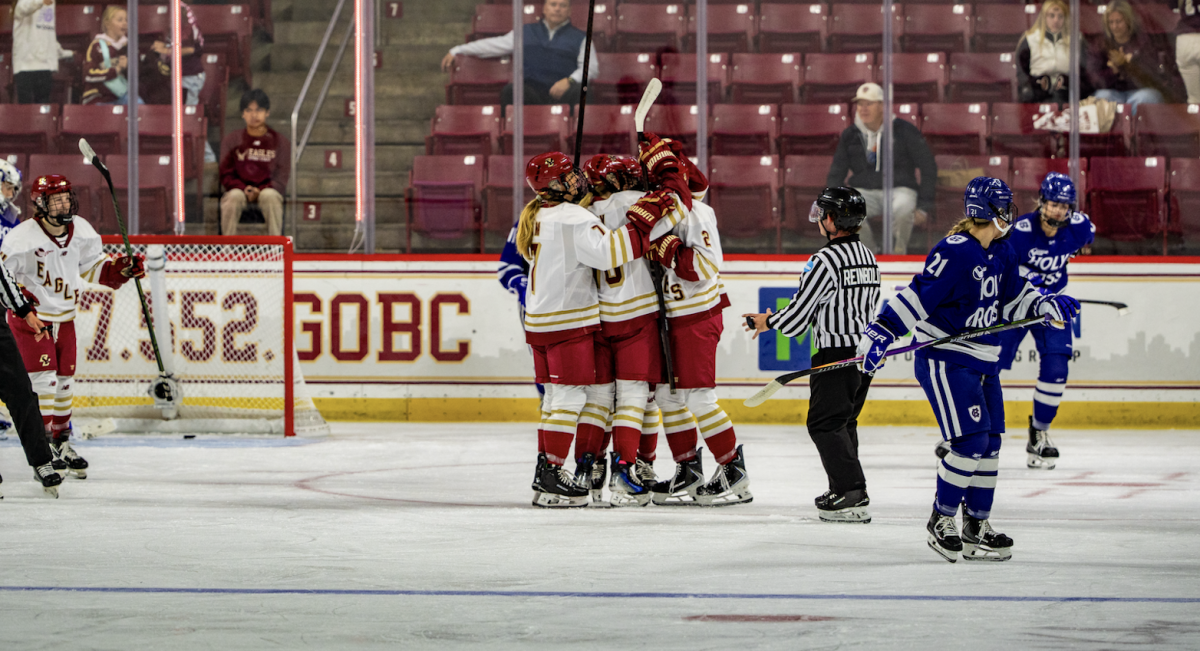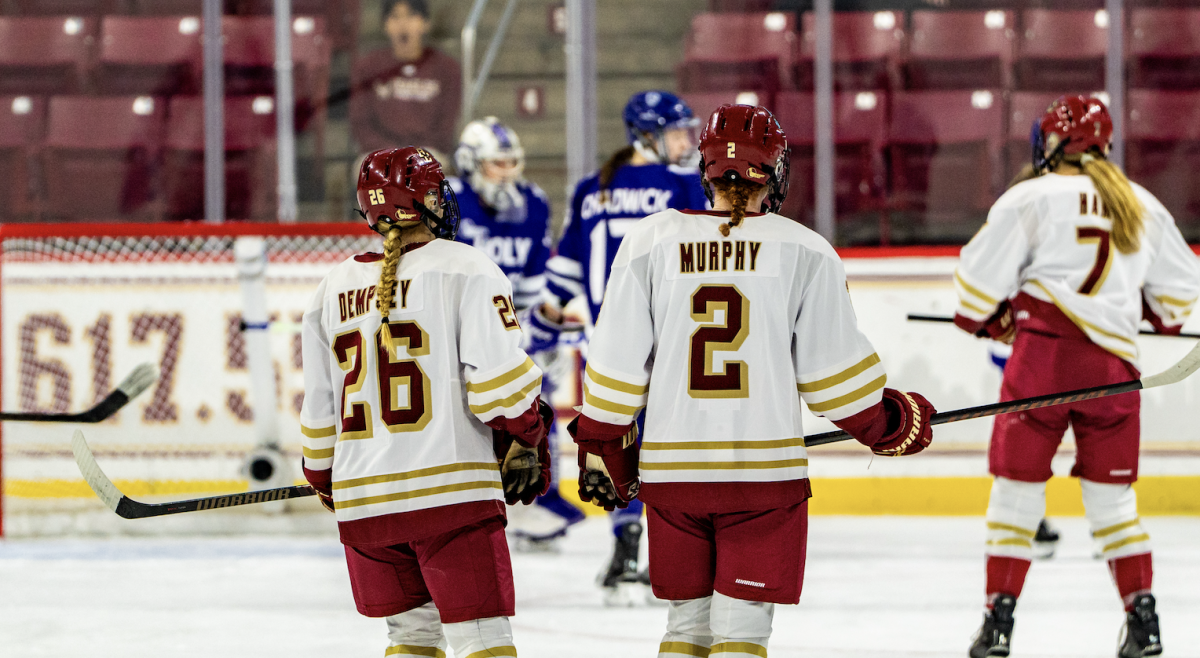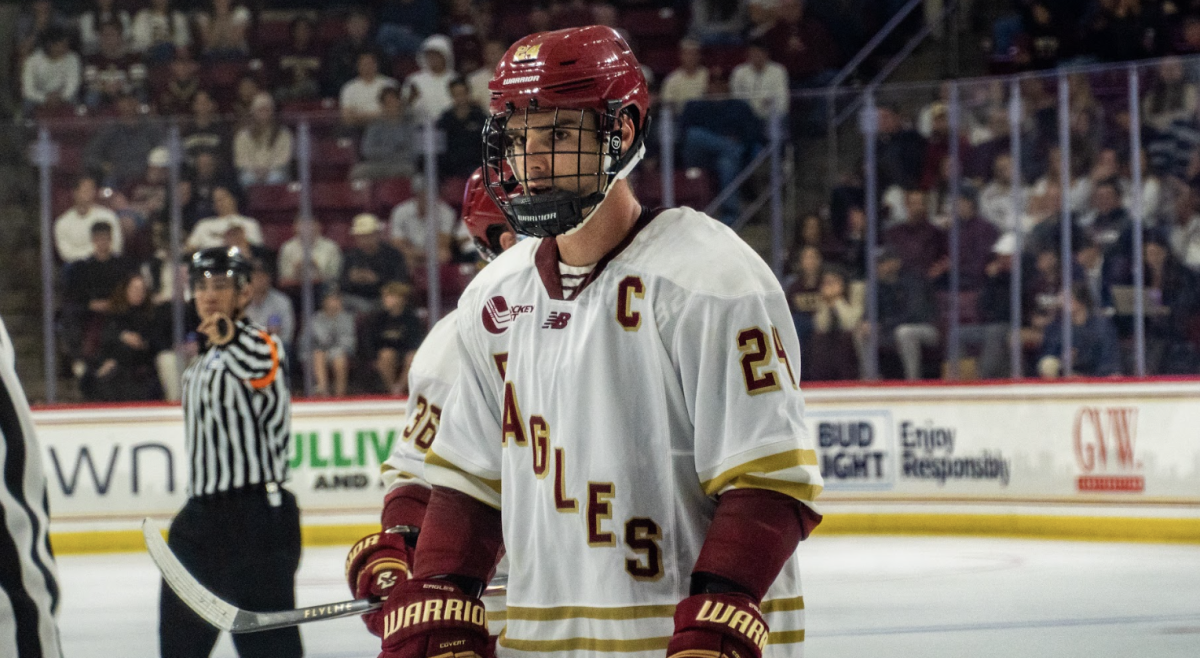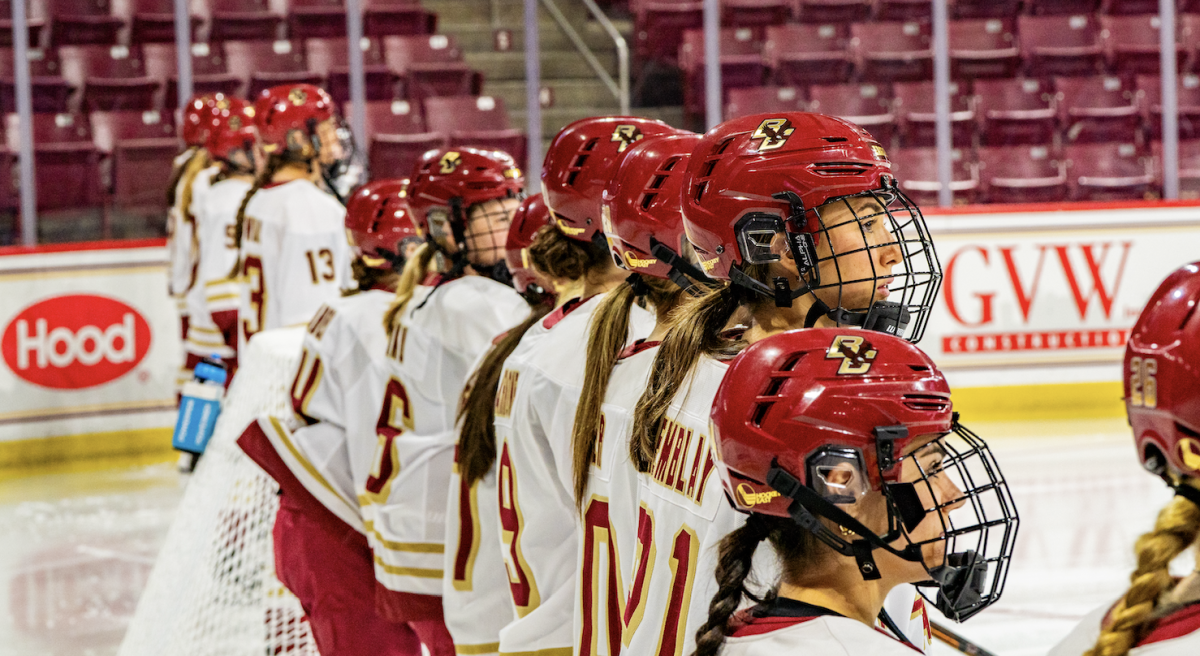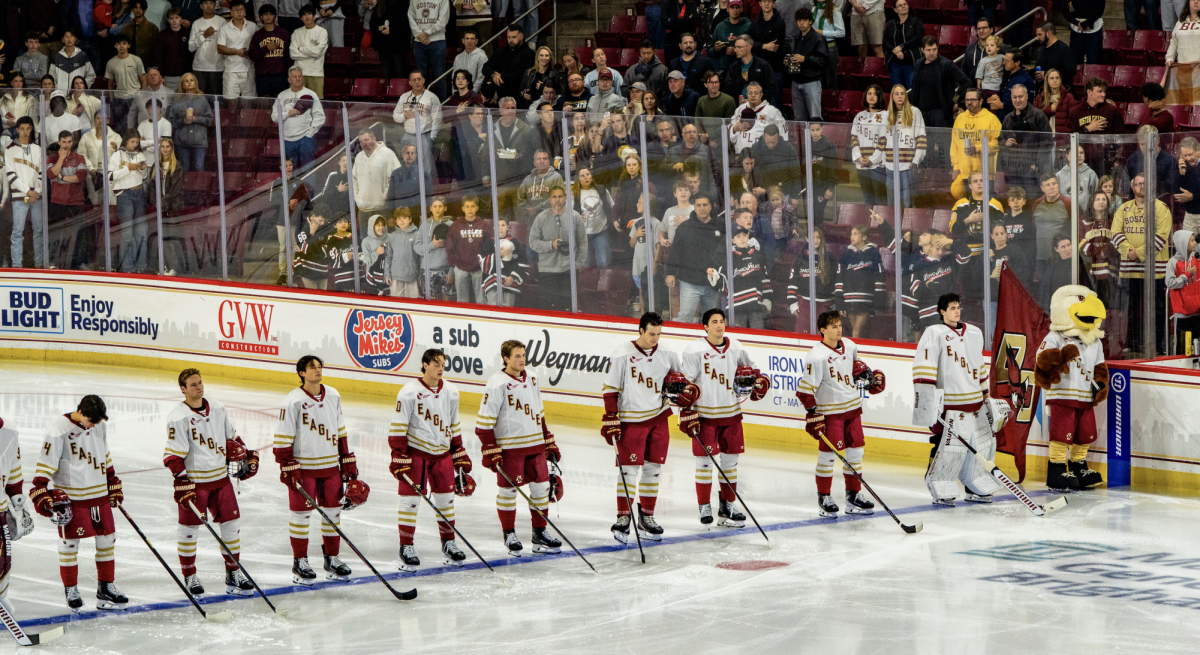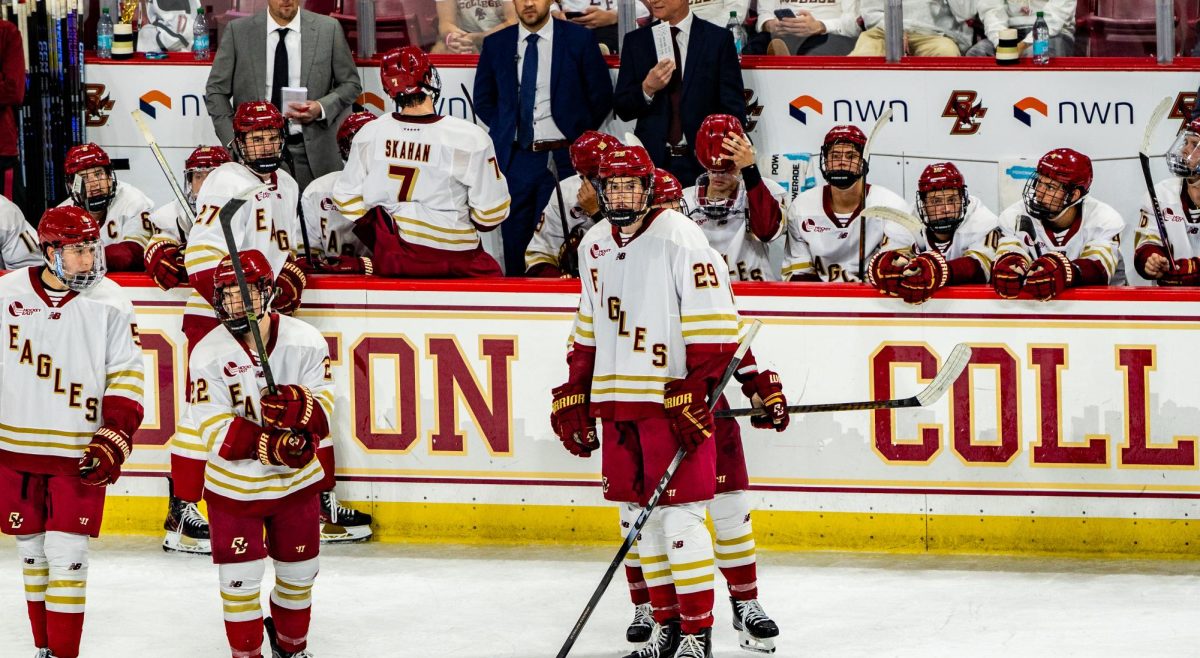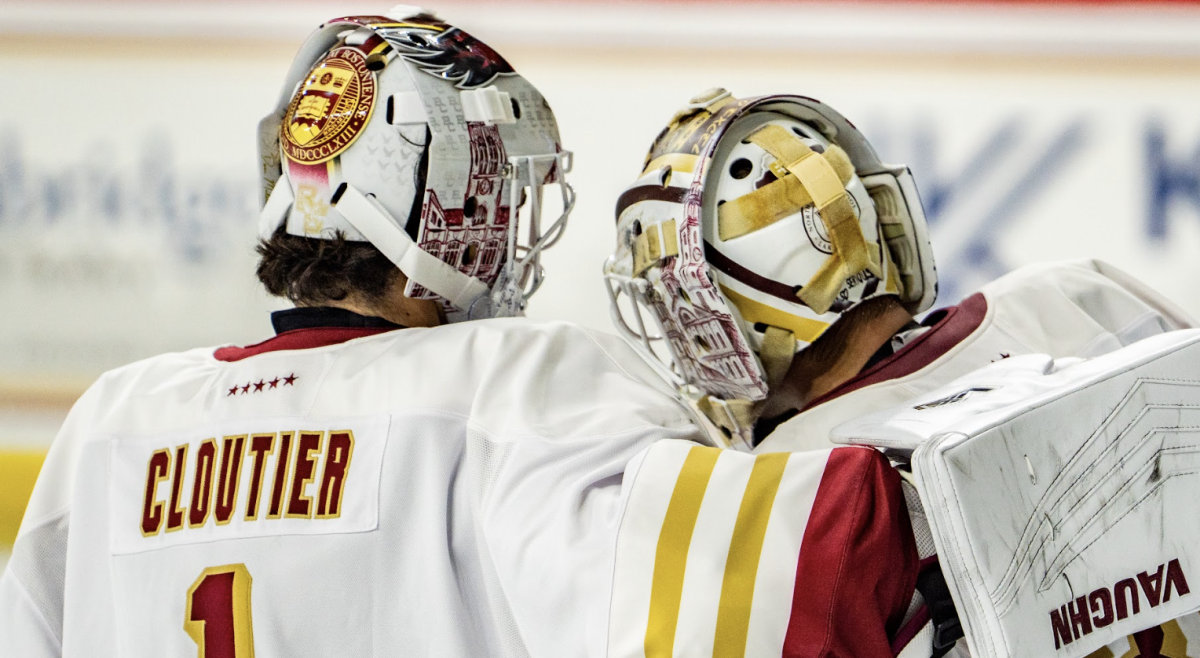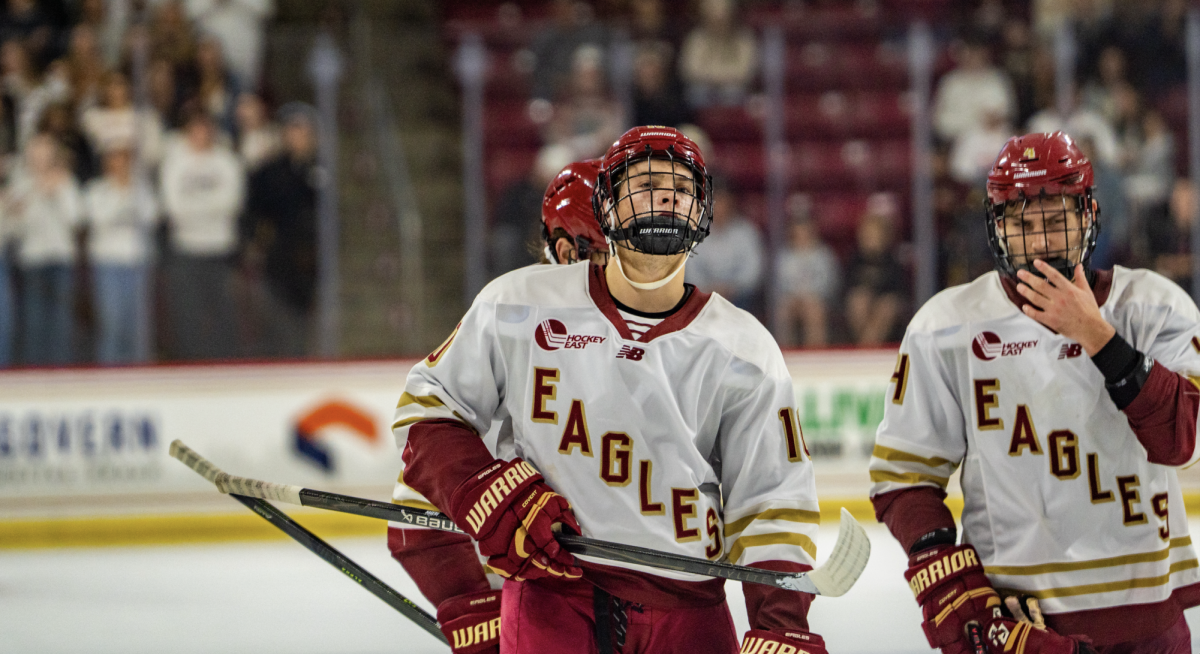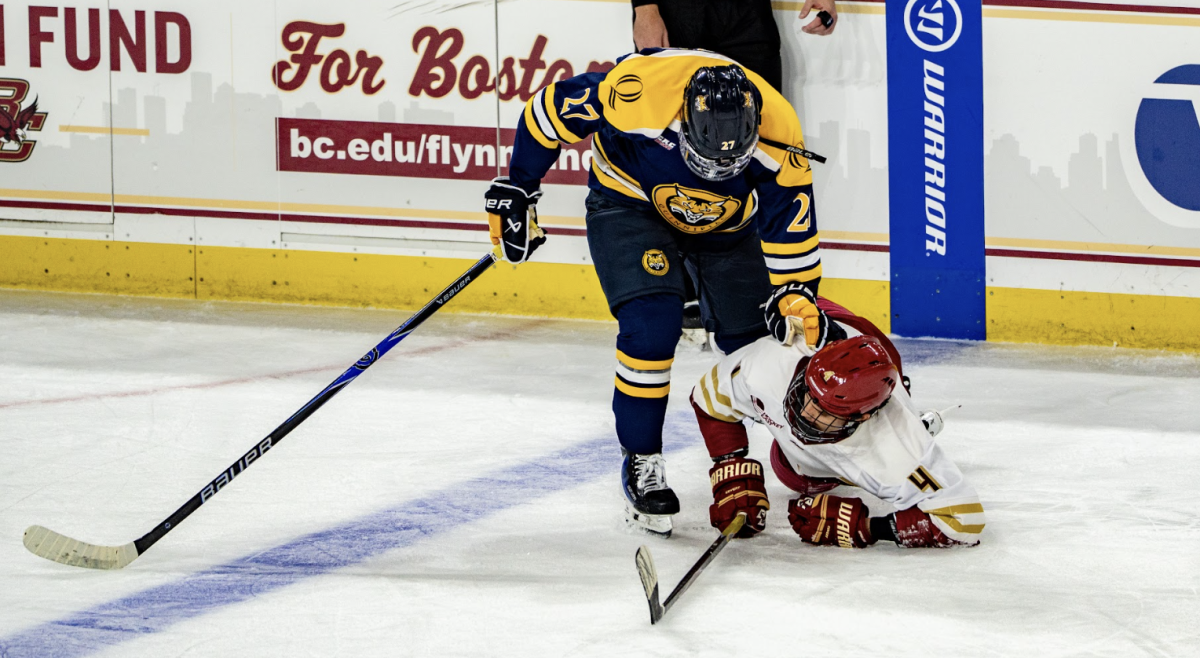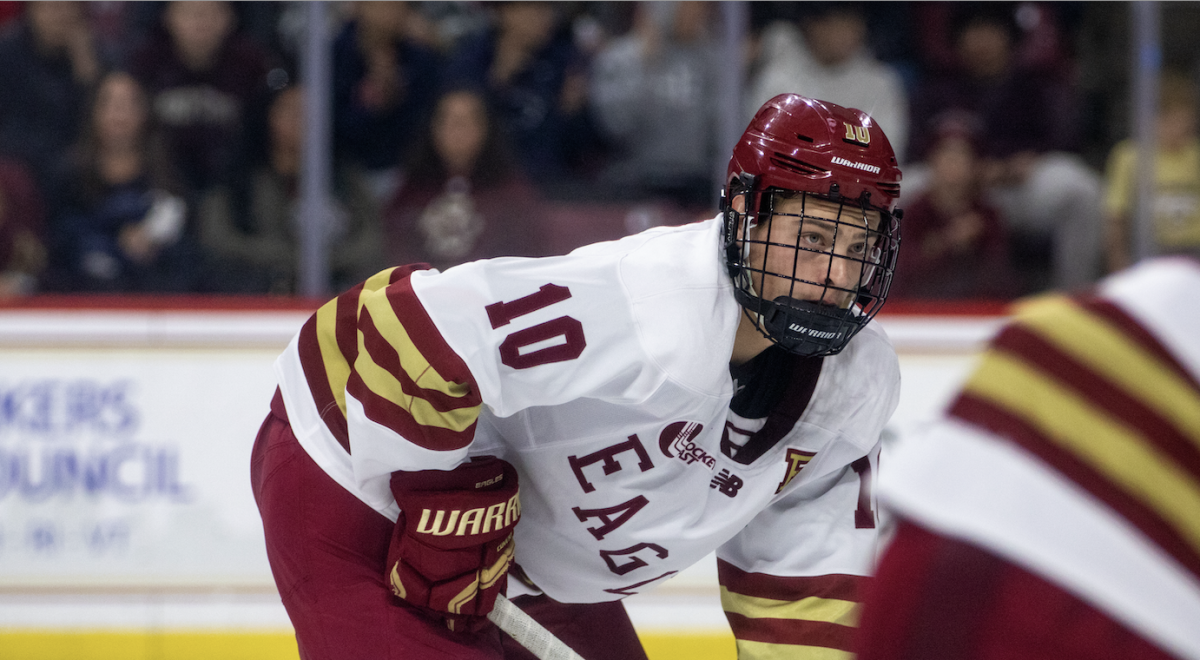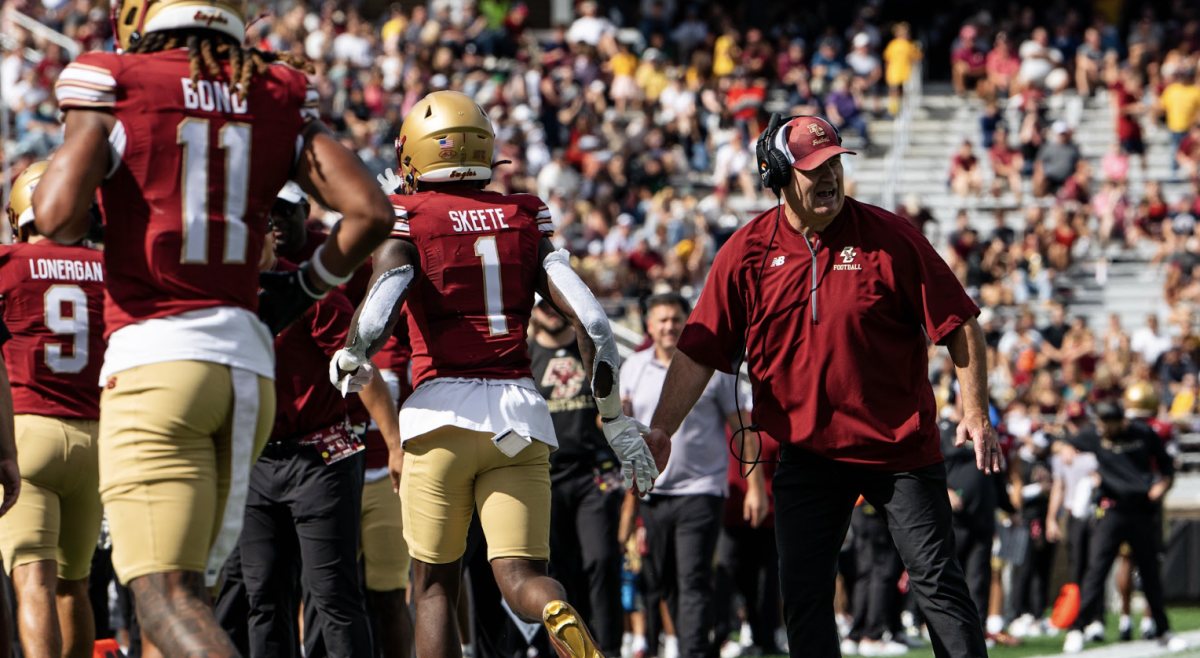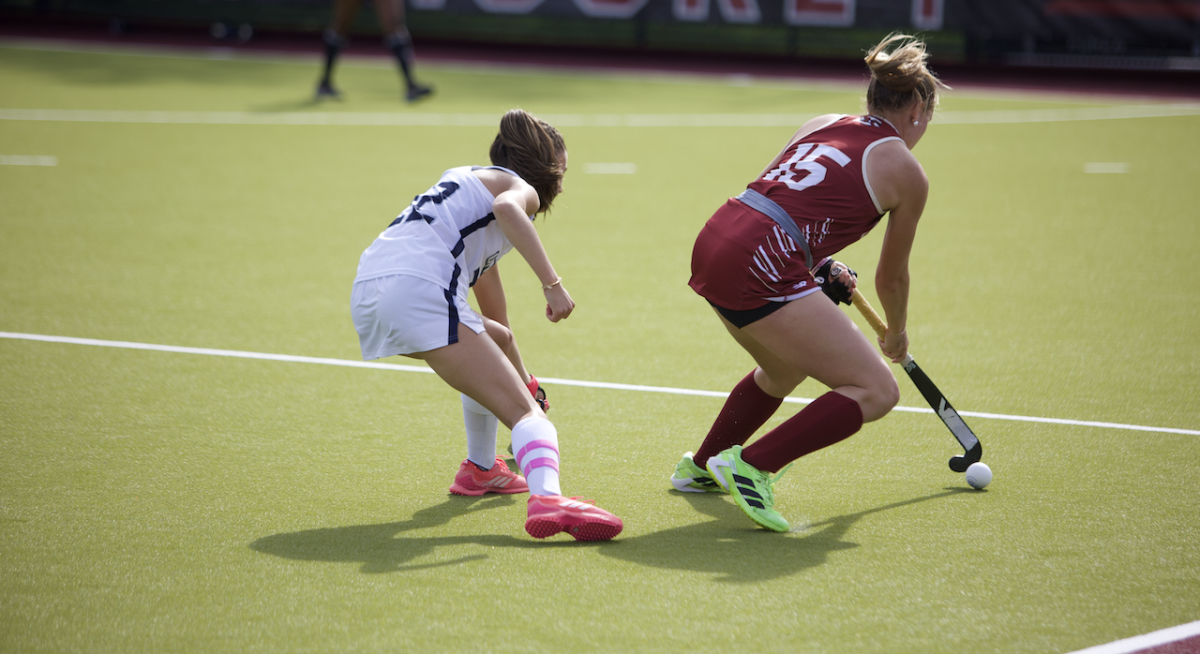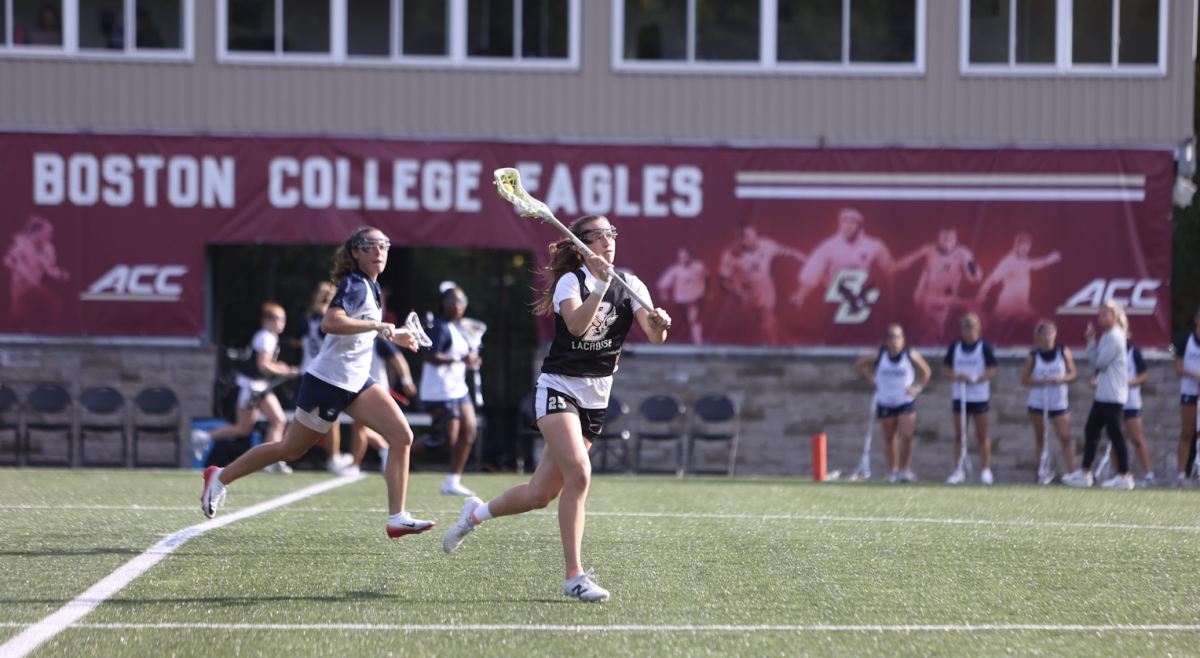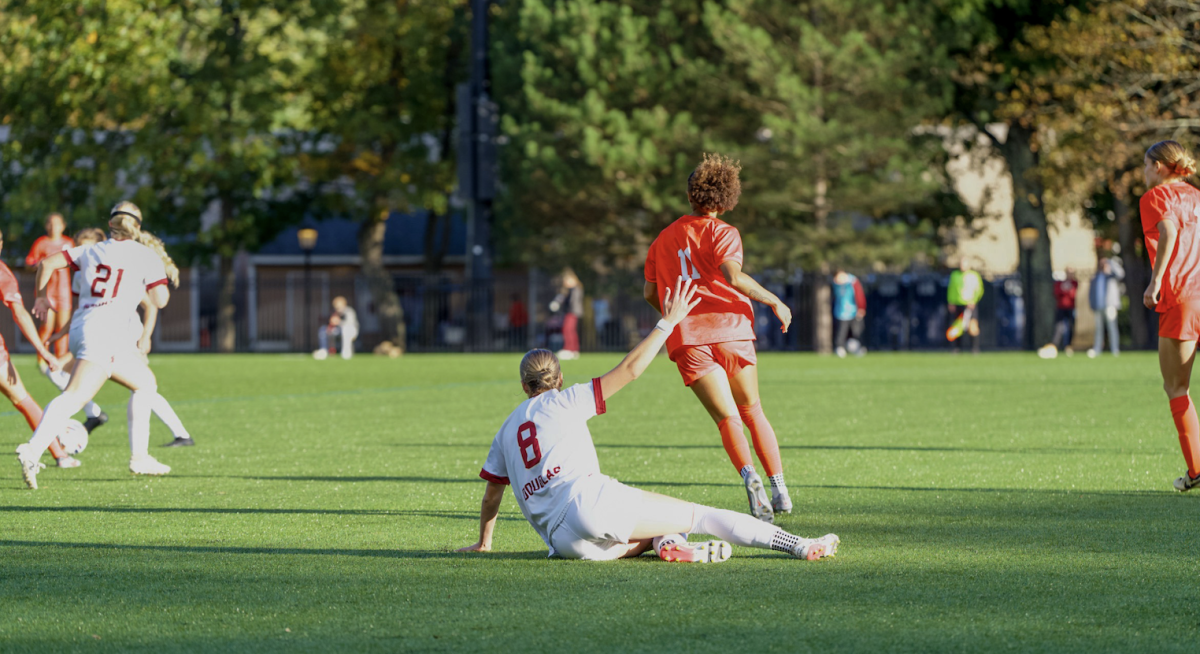Prior to its month-long break in between the two halves of the season, Boston College men’s hockey had maintained a nine-game winning streak to boost the team to its current ranking of fifth nationally. In Saturday’s conference matchup against Vermont (3-12-2, 0-9-1 Hockey East), the Eagles (12-4, 6-2) were eager to come back from their holiday hiatus and continue their hot streak.
With BC’s freshman goalie, Spencer Knight, out due to the World Junior Championships, senior Ryan Edquist had the start. Prior to this game, Edquist hadn’t seen a start since last January in BC’s 7-2 loss against Maine. And yet, Edquist thrived as he helped lead the Eagles to an 8-3 win over Vermont.
While the final score implies that the Eagles completely dominated Vermont, for the first 10 minutes of the game, it was all Vermont. Not only did the Catamounts score first with a power-play goal by Vlad Dzhioshvili five minutes into the game, but they also controlled the play, keeping the Eagles to only one shot on net in the opening half of the first period.
Vermont’s ease with which it began this matchup can be attributed to its second half schedule—the Catamounts only had a three-week break, returning to play two games just before New Year’s. Once the Eagles became more comfortable, however, there was no stopping them.
The Eagles began to show just how deep their bench was shortly after the 10-minute mark in the first frame. Collecting a centering feed by freshman Matt Boldy, senior Ron Greco found space and tucked the puck high short side against Vermont’s goalie, Stefanos Lekkas. The goal simultaneously put BC on the board and marked Greco’s first goal of the season.
The senior forward’s tally energized the Eagles. BC drew a penalty from Vermont soon after, but the team was unable to capitalize on its man advantage, allowing the penalty to expire. The lack of goals in the majority of the remaining minutes of the period was not due to a lack of chances—rather, it was a valiant effort from Lekkas that kept the Eagles from adding to Greco’s goal.
It was BC’s third line that would net the next point for the Eagles, continuing to show off the Eagles’ talented depth. Smooth tape-to-tape passes from freshmen Mike Hardman and Alex Newhook to junior Aapeli Räsänen for a snipe past Lekkas put the Eagles up 2-1 with just under three minutes in the first frame. Twenty-one seconds after Räsänen netted his goal, sophomore Marc McLaughlin beat Lekkas, extending BC’s lead to two goals.
Vermont has struggled to score this season, averaging 1.26 goals per game. Now, the Catamounts needed to score a minimum of four goals to come out with a win, a feat Vermont only achieved once this season, in a 7-4 loss to UConn. But despite the colossal task before them, Vermont seemed determined to come back from its deficit. The Catamounts came out of the locker room reinvigorated, once again dominating the beginning of the period.
Vermont netted the first goal of the period early on with an even-strength goal tallied by Simon Boyko, beating Edquist five-hole. Boyko’s goal brought the Catamounts within one and led to Vermont taking more control of the game. The Catamounts were clearly the superior team in the second period, drawing penalties to give them a man advantage and more chances to catch up to BC. Despite Vermont’s physical and dominant play over the Eagles, it was BC that increasingly found the back of the net.
With three minutes remaining in the period, Greco collected his second goal of the night with a bank shot off Lekkas, coming from a negative angle. This goal marked his second-ever multi-goal night as he helped put the Eagles back up by two goals.
The third period only got worse for the Catamounts. The Eagles regained control of the play and asserted their dominance by quickly scoring two goals in the first four minutes of the period. The first goal, scored by Jesper Mattila through traffic, put BC up 5-2 against Vermont. But it also led to the dismissal of BC’s assistant captain, Graham McPhee, for a two-minute minor and 10-minute misconduct penalty for unsportsmanlike conduct. The second goal came during BC’s penalty kill, with Logan Hutsko streaking into the offensive zone shorthanded, beating Lekkas glove side.
Shortly after Hutsko’s goal, tension was high between the two teams. During a battle in front of BC’s net, Ace Cowans—a Vermont forward—lodged his stick in the cage of Edquist’s mask. Edquist was okay, and the ensuing powerplay allowed BC captain David Cotton to net a goal of his own, as he deflected a pass from linemate Julius Mattila.
Even though the Catamounts were down 7-2, they refused to give up. They continued drawing penalties, earning themselves a two-minute advantage following a tripping call on BC defenseman Luke McInnis, but they were still unable to capitalize on their powerplay. But shortly after, Vermont got one back on the Eagles, with a snipe by Cowans that beat Edquist high glove side.
With the game winding down, the Eagles added one more point to the board. The goal, initially assumed to be scored by McLaughlin, who had taken the original shot, had been tipped into the net by Greco’s stick, giving the senior his first career hat trick and boosting the Eagles to a final score of 8-3. With Greco’s hat trick to cap off the game, the Eagles collected the well-earned win and extended their winning streak.
Still, despite the score indicating a “blowout” of a game, the win was not as clear-cut as it implies.
“If you look at the box score it says 8-3,” said head coach Jerry York following the win. “The game was a lot tighter than that.”
While the Eagles were able to escape the post-holiday slump, there were still some places for improvement—namely, taking fewer penalties. The Eagles took six penalties compared to Vermont’s four, which could have cost them.
And yet, while there may be things to criticize, BC was able to show off just how deep its lineup is. Five of the eight goals were scored by the third and fourth lines—Greco had three goals, and McLaughlin and Räsänen each had one. Saturday’s game showed that the Eagles were more than just their top line. They can pull from each of their forwards and be able to produce in high-pressure moments.
Featured Image by Kait Devir / Heights Staff


